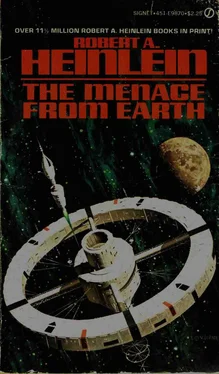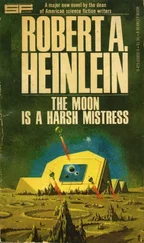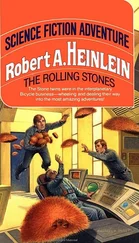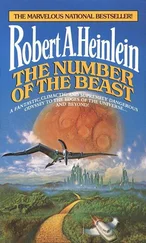Robert Heinlein - The Menace From Earth
Здесь есть возможность читать онлайн «Robert Heinlein - The Menace From Earth» весь текст электронной книги совершенно бесплатно (целиком полную версию без сокращений). В некоторых случаях можно слушать аудио, скачать через торрент в формате fb2 и присутствует краткое содержание. Издательство: New Age Library, Жанр: Фантастика и фэнтези, на английском языке. Описание произведения, (предисловие) а так же отзывы посетителей доступны на портале библиотеки ЛибКат.
- Название:The Menace From Earth
- Автор:
- Издательство:New Age Library
- Жанр:
- Год:неизвестен
- ISBN:нет данных
- Рейтинг книги:3 / 5. Голосов: 1
-
Избранное:Добавить в избранное
- Отзывы:
-
Ваша оценка:
- 60
- 1
- 2
- 3
- 4
- 5
The Menace From Earth: краткое содержание, описание и аннотация
Предлагаем к чтению аннотацию, описание, краткое содержание или предисловие (зависит от того, что написал сам автор книги «The Menace From Earth»). Если вы не нашли необходимую информацию о книге — напишите в комментариях, мы постараемся отыскать её.
The Menace From Earth — читать онлайн бесплатно полную книгу (весь текст) целиком
Ниже представлен текст книги, разбитый по страницам. Система сохранения места последней прочитанной страницы, позволяет с удобством читать онлайн бесплатно книгу «The Menace From Earth», без необходимости каждый раз заново искать на чём Вы остановились. Поставьте закладку, и сможете в любой момент перейти на страницу, на которой закончили чтение.
Интервал:
Закладка:
"Well…okay." He took the pad, began sketching a radio circuit, while Jane watched. He signed it with a "Clem," the radioman's cartoon of the little fellow peering over a fence.
"That's fine!" said Reynolds. "Finished, Joan?"
"Yes, Doctor." He fetched her pad; the diagram was correct—but Joan had added to "Clem" a wink.
Reynolds interrupted awed comment with, "I will skip card, demonstrations and turn to telekinesis. Has anyone a pair of dice?" No one volunteered; he went on, "We have some supplied by your physics department. This chuck-a-luck cage is signed and sealed by them and so is this package." He broke it open, spilled out a dozen dice. "Two-Gun, how about some naturals?"
"I'll try, Prof."
"General LaMott, please select a pair and put them In this cup."
The general complied and handed the cup to Andrews. "What are you going to roll, soldier?"
"Would a sixty-five suit the General?"
"If you can."
"Would the General care to put up a five spot, to make it interesting?" He waited, wide-eyed and innocent.
LaMott grinned. "You're faded, soldier." He peeled out a five; Andrews covered it, rattled the cup and rolled. One die stopped on the bills—a five. The other bounced against a chair—a six.
"Let it ride, sir?"'
"I'm not a sucker twice. Show us some naturals."
"As you say, sir." Two-Gun picked up the money, then rolled 6-1, 5-2, 4-3, and back again. He rolled several 6's, then got snake eyes. He tried again, got acey-deucey. He faced the little old lady. "Ma'am," he said, "if you want to roll, why don't you get down here and do the work?"
"Why, Mr. Andrews!"
Reynolds said hastily, "You'll get your turn, Mrs. Wilkins."
"I don't know what you gentlemen are talking about." She resumed tatting.
Colonel Hammond sat down by the redheads. "You're the January Twins—aren't you?"
"Our public!" one answered delightedly.
"The name is ‘Brown,'" said the other.
"‘Brown,'" he agreed, "but how about a show for the boys?"
"Dr. Reynolds wouldn't like it," the first said dutifully. "I'll handle him. We don't get USO; security regulations are too strict. How about it, Joan?"
"I'm Jane. Okay, if you fix it with Prof."
"Good girls!" He went back to where Grandma Wilkins was demonstrating selection—showers of sixes in the chuck-a-luck cage. She was still tatting. Dr. Withers watched glumly. Hammond said, ‘Well, Doc?"
"These things are disturbing," Withers admitted, "but it's on the molar level—nothing affecting the elementary particles."
"How about those sketches?"
"I'm a physicist, not a psychologist. But the basic particles—electrons, neutrons, protons—can't be affected except with apparatus designed in accordance with the laws of radioactivity. Dr. Reynolds was in earshot; at Withers' remark he said, "Thank you, Mrs. Wilkins. Now, ladies and gentlemen, another experiment. Norman!"
The colored boy opened his eyes. "Yeah, Prof?"
"Up here. And the team from your physics laboratory, please. Has anyone a radium-dial watch?"
Staff technicians hooked the Geiger counter through an amplifier so that normal background radioactivity was heard as occasional clicks, then placed a radium-dial watch close to the counter tube; the clicks changed to hail-storm volume. "Lights out, please," directed Reynolds.
The boy said, "Now, Prof?"
"Wait, Norman. Can everyone see the watch?" The silence was broken only by the rattle of the amplifier, counting radioactivity of the glowing figures. "Now, Norman!"
The shining figures quenched out; the noise, died to sparse clicks.
The same group was in a blockhouse miles out in the desert; more miles beyond was the bomb proving site; facing it was a periscope window set in concrete and glazed with solid feet of laminated filter glass. Dr. Reynolds was talking with Major General Hanby. A naval captain took reports via earphones and speaker horn; he turned to the C.O. "Planes on station, sir."
"Thanks, Dick."
The horn growled, "Station Charlie to Control; we fixed it."
The navy man said to Hanby, "All stations ready, range clear."
"Pick up the count."
"All stations, stand by to resume count at minus seventeen minutes. Time station, pick up the count. This is a live nun. Repeat, this is a live run."
Hanby said to Reynolds, "Distance makes no difference?"
"We could work from Salt Lake City once my colleagues knew the setup." He glanced down. "My watch must have stopped."
"Always feels that way. Remember the metronome on the first Bikini test? It nearly drove me nuts."
"I can imagine. Um, General, some of my people are high-strung. Suppose I ad lib?"
Hanby smiled grimly. "We always have a pacifier for visitors. Doctor Withers, ready with your curtain raiser?"
The chief physicist was bending over a group of instruments; he looked tired. "Not today," he answered in a flat voice. "Satterlee will make it."
Satterlee came forward and grinned at the brass and V.I.P.'s and at Reynolds' operators. "I've been saving a joke for an audience that can't walk out. But first—" He picked up a polished metal sphere and looked at the ES.P. adepts. "You saw a ball like this on your tour this morning. That one was plutonium; it's still out there waiting to go bang! in about... eleven minutes. This is merely steel—unless someone has made a mistake. That would be a joke—we'd laugh ourselves to bits!"
He got no laughs, went on: "But it doesn't weigh enough; we're safe. This dummy has been prepared so that Dr. Reynolds' people will have an image to help them concentrate. It looks no more like an atom bomb than I look like Stalin, but it represents—if it were plutonium—what we atom tinkerers call a ‘subcritical mass.' Since the spy trials everybody knows how an atom bomb works. Plutonium gives off neutrons at a constant rate. If the mass is small, most of them escape to the outside. But if it is large enough, or a critical mass, enough are absorbed by other nuclei to start a chain reaction. The trick is to assemble a critical mass quickly— then run for your life! This happens in microseconds; I can't be specific without upsetting the security officer.
"Today we will find out if the mind can change the rate of neutron emission in plutonium. By theories sound enough to have destroyed two Japanese cities, the emission of any particular neutron is pure chance, but the total emission is as invariable as the stars in their courses. Otherwise it would be impossible to make atom bombs.
"By standard theory, theory that works, that subcritical mass out there is no more likely to explode than a pumpkin. Our test group will try to change that. They will concentrate, try to increase the probability of neutrons' escaping, and thus set off that sphere as an atom bomb."
"Doctor Satterlee?" asked a vice admiral with wings. "Do you think it can be done?"
"Absolutely not!" Satterlee turned to the adepts. "No offense intended, folks."
"Five minutes!" announced the navy captain.
Satterlee nodded to Reynolds. "Take over. And good luck." Mrs. Wilkins spoke up. "Just a moment, young man. These ‘neuter' things. I—"
"Neutrons, madam."
"That's what I said. I don't quite understand. I suppose that sort of thing comes in high school, but I only finished eighth grade. I'm sorry."
Satterlee looked sorry, too, but, he tried. "—and each of these nuclei is potentially able to spit out one of these little neutrons. In that sphere out there"—he held up the dummy—"There are, say, five thousand billion trillion nuclei, each one—"
"My, that's quite a lot, isn't it?"
"Madam, it certainly is. Now—"'
"Two minutes!"
Reynolds interrupted. "Mrs.. Wilkins, don't worry. Concentrate on that metal ball out there and think about those neutrons, each one ready to come out. When I give the word, I want you all—you especially, Norman—to think about that ball, spitting sparks like a watch dial. Try for more sparks. Simply try. It you fail, no one will blame you. Don't get tense."
Читать дальшеИнтервал:
Закладка:
Похожие книги на «The Menace From Earth»
Представляем Вашему вниманию похожие книги на «The Menace From Earth» списком для выбора. Мы отобрали схожую по названию и смыслу литературу в надежде предоставить читателям больше вариантов отыскать новые, интересные, ещё непрочитанные произведения.
Обсуждение, отзывы о книге «The Menace From Earth» и просто собственные мнения читателей. Оставьте ваши комментарии, напишите, что Вы думаете о произведении, его смысле или главных героях. Укажите что конкретно понравилось, а что нет, и почему Вы так считаете.








